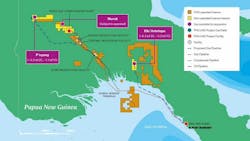Papua New Guinea’s Petroleum Minister Kerenga Kua has stated that the ExxonMobil Corp.-led development of P’nyang natural gas field in the Western Highlands, along with a third LNG train at the PNG LNG project plant at Caution Bay near Port Moresby, will be treated as an integrated stand-alone gas project under the terms of a gas agreement that will be separate from the terms of the agreements governing the initial PNG LNG and the new Papua LNG projects.
Kua said concessions made for PNG LNG and Papua LNG will not be readily available for the P’nyang project.
Kua was speaking after the passing of the legislative amendments this week that gave effect to the gas agreement for Papua LNG (Elk-Antelope fields development) that was signed by the previous government in April.
Kua said the fiscal terms for Papua LNG were a slight improvement on the original PNG LNG project, including accommodation for state equity back-in plus agreed concessions for national content, third-party pipeline access, an option for government-owned Kumul Petroleum Holdings Ltd. to own the project pipeline, and the option for national entities to own LNG vessels.
However, the minister said the Papua New Guinea government expected the P’nyang project agreement to go further and deliver much better fiscal and economic benefits for the country. He said most of the joint venture participants in Papua LNG were the same as those in PNG LNG and P’nyang and they had been benefitting from what he called generous concessions offered for the initial PNG LNG project since it came on stream in 2014.
Kua said the government did have the option of deferring the P’nyang project until the proposed new oil and gas legislation and revised fiscal regime were introduced in 2020. Nevertheless, he said it was more beneficial to have the P’nyang gas agreement negotiated and signed under the existing Oil and Gas Act 1998.
This will mean that construction and development work for P’nyang can follow directly on the heels of work on Papua LNG, thus extending the economic boom from 4 years for a single project to 8 years for the two projects. Kua added that the state was a participant in the projects and wanted to benefit from the economic savings brought by the combined engineering, financing, and construction of the total of three LNG trains that will come from Papua LNG and P’nyang.
The minister said the government expected to sign the P’nyang agreement in November.
